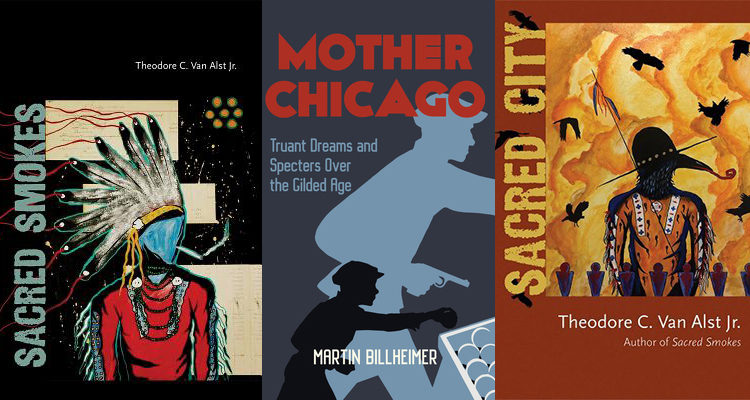Authors and lifelong friends Martin Billheimer and Theodore C. Van Alst Jr. write very different books, but the Windy City looms large in each of their works.
Beyond having “Chicago” in its title, Billheimer’s Mother Chicago: Truant Dreams and Specters over the Gilded Age shines an honest and unflinching light on redlining, property speculation, racism, and other boundaries—both physical demarcations and social means of limitation and separation—that have functioned t0 trap people in segments on the city and in their assigned stations in society for generations. In his Sacred Smokes novel and its follow-up, Sacred City, Van Alst Jr. uses Chicago as a backdrop on which to project stories of a Native American gang member’s struggle to survive on the streets of a city (and in a world) that shows a blatant disregard for people like him.
Together, Billheimer and Theodore Van Alst Jr. show sides of Chicago you’ve never seen before. They write of race, division, and the enduring spirit of the many marginalized voices who call Chicago home. They will both be on-site at Lion’s Tooth in Bay View on Friday, May 6 to read selections from their books and to “discuss how cities become characters in fiction and non-fiction” during a “Chicago Boys: Working Class Readings About Chicago As Place And Character” author event.
This free event will be moderated by Feral House publisher and Milwaukee-based author Christina Ward. Outside of Feral House publishing Mother Chicago, Ward has a deep respect for these authors and an extensive knowledge of their work. Since she’ll be leading the discussion of the event she helped organize on Friday night, we asked her to tell us why these books and these authors are important to her. Here’s what she had to say:
I’m often asked about the book publishing industry: Why this book, author, story, and not any of the thousands of others that come to my attention? The first thing that will catch my eye is the writing itself. Sentences that convey multiple depths of meaning and flow with assurance and, sometimes, audacity will always draw me in.
Good writing is assumed by readers but much harder to achieve in practice. Yes, fiction offers more flexibility with structure and style. Yet, when a writer attempts to bring his vision of history in a wholly unconventional manner, I am more than interested; I’m intrigued.
It was the idiosyncratic style of Martin Billheimer’s writing that positively floored me. His culture columns for CounterPunch Magazine, in the guise of critical reviews of books and movies, explored arcane confluences of politics and art. The writing and ideas challenged readers to see beyond the work under discussion and place it in the context of the culture. It is the type of critique only attempted by sure-handed masters like the irascible Gore Vidal and Christopher Hitchens or by brilliant autodidacts without the burden of academic censor and economic punishment like Martin Billheimer.
Mother Chicago: Truant Dreams and Specters over the Gilded Age is Billheimer’s first book. It is both a history and a lament. Mother Chicago sees (and explains to us) how cities, by their very nature, impose their oppressive structure upon us. He shows through grim revelations of abuse and excess how society’s inclination is to shun those who do not conform to the current standards of acceptable-ness. Yet, despite all the sordid details in the story of early 20th Century tuberculosis hospitals, poor farms, and orphanages, Billheimer finds the ragged beauty of the people who lived in these wretched places. He gives the lost and forgotten souls their proper due by telling their story.
Theodore Van Alst, Jr. also grew up in Chicago, a Chicago reflected in his novels Sacred Smokes and Sacred City. But like Billheimer—his friend of many decades—the Chicago portrayed here isn’t populated by John Hughes stereotypes suppressing their middle-class angst in suburban high schools or dimwitted Bears fans served up for laughs. Van Alst’s Chicago is, another view of the city revealed in Mother Chicago, a place of boundaries, demarcations, and no man’s lands. Van Alst, Director, School of Gender Race and Nations / Professor and Chair, Indigenous Nations Studies at Portland State University, refers to himself as “city Indian.” A result of the 20th-century diaspora in Native American history when people were forcibly removed to reservations and then later came to the industrial cities of the Midwest to work. Another missing piece of history in the story of the United States.
Van Alst’s writing is diamond-sharp, lacerating readers with depictions of growing up in the gang-ruled streets of Chicago during the 1970s and ’80s. Sacred Smokes and Sacred City ripple with brutal humor as the characters make the only bad choices available to them.
Read together, Mother Chicago and Sacred Smokes/City shows the resilience of oppressed peoples of every stripe.
“Chicago Boys: Working Class Readings About Chicago As Place And Character” will take place at Lion’s Tooth in Bay View on Friday, May 6. In addition to readings from the three books and what’s sure to be compelling conversation between Ward and the two guest authors, Lion’s Tooth will have beer and wine available for purchase at the book shop’s bar. There will also be complimentary hors d’ouerves—including Indian tacos from Morning Starr’s Fry Bread—and other snacks on hand. The event runs from 6:30 p.m. to 8 p.m. and is free to attend. You can learn more about the event here.

